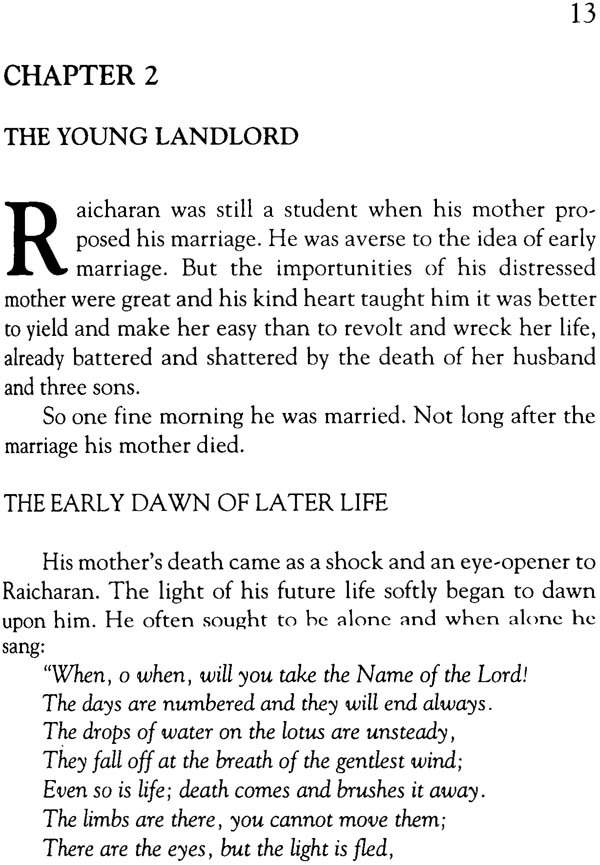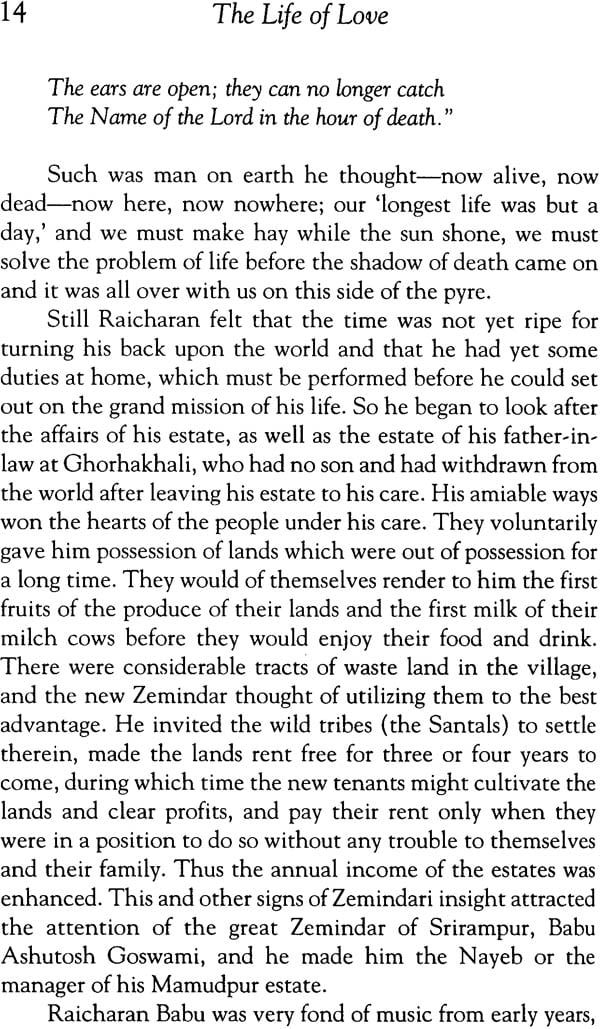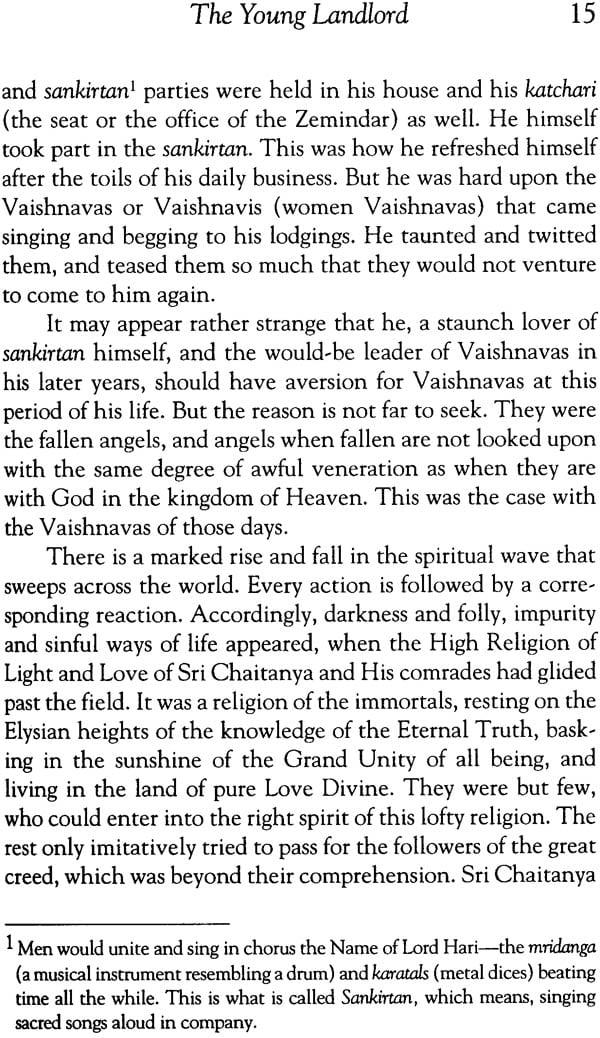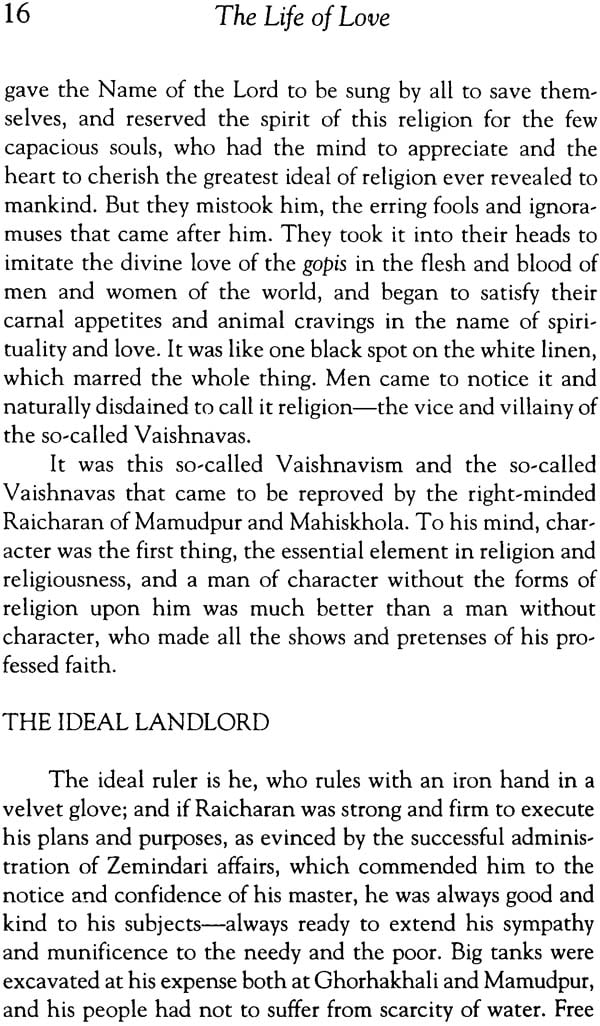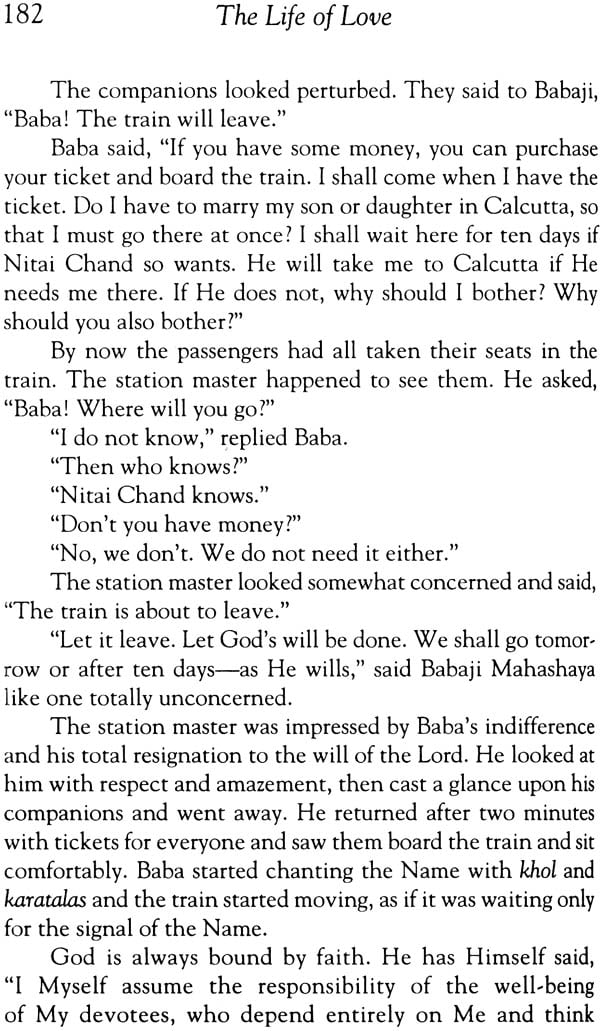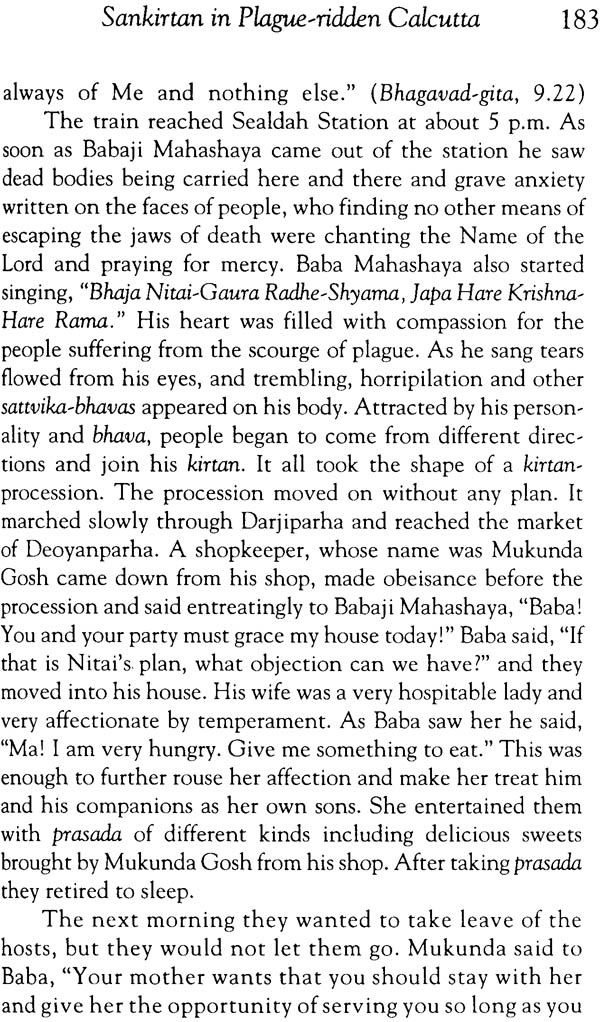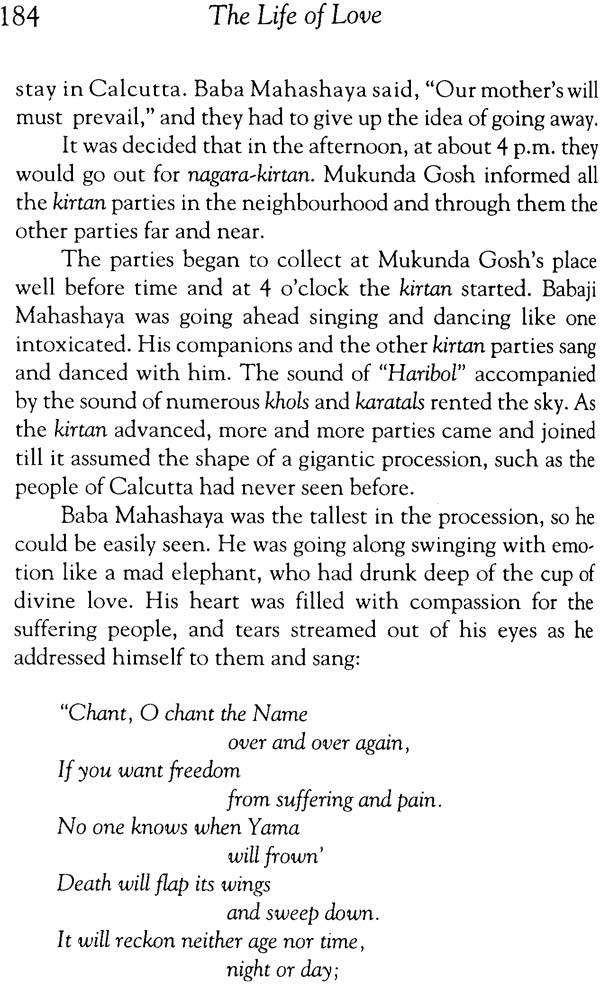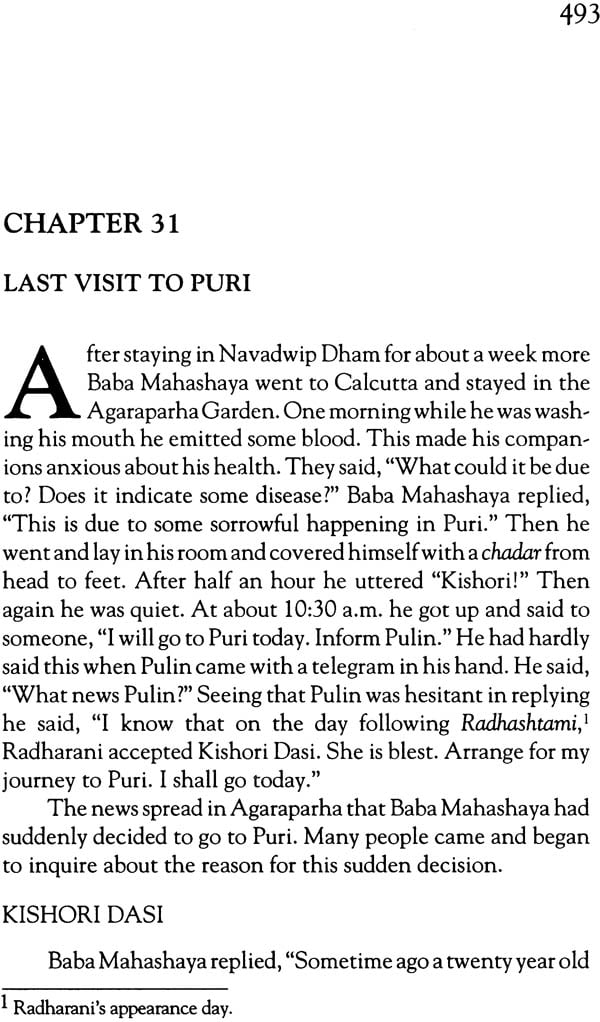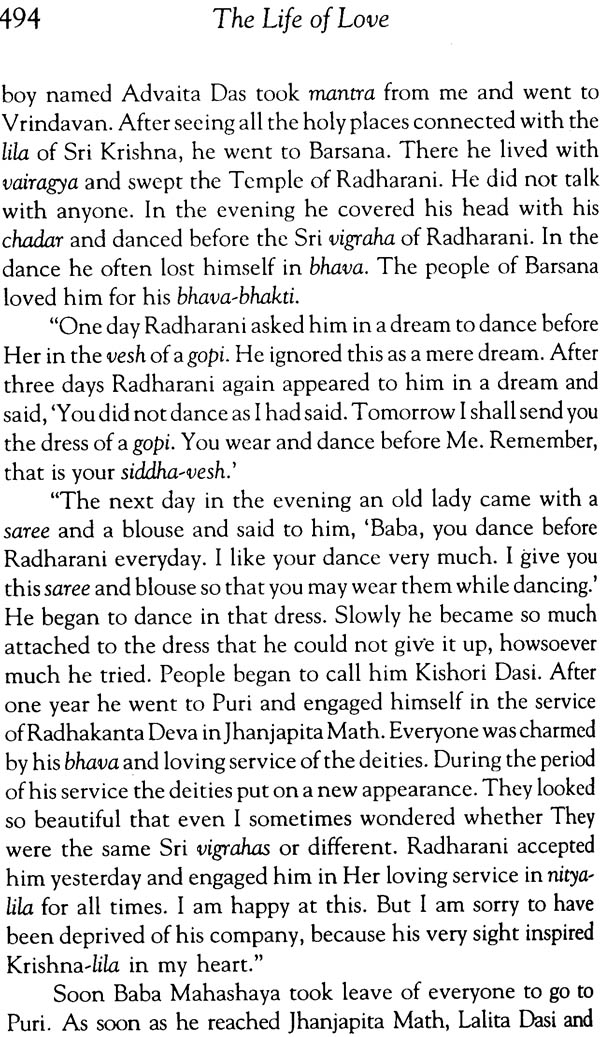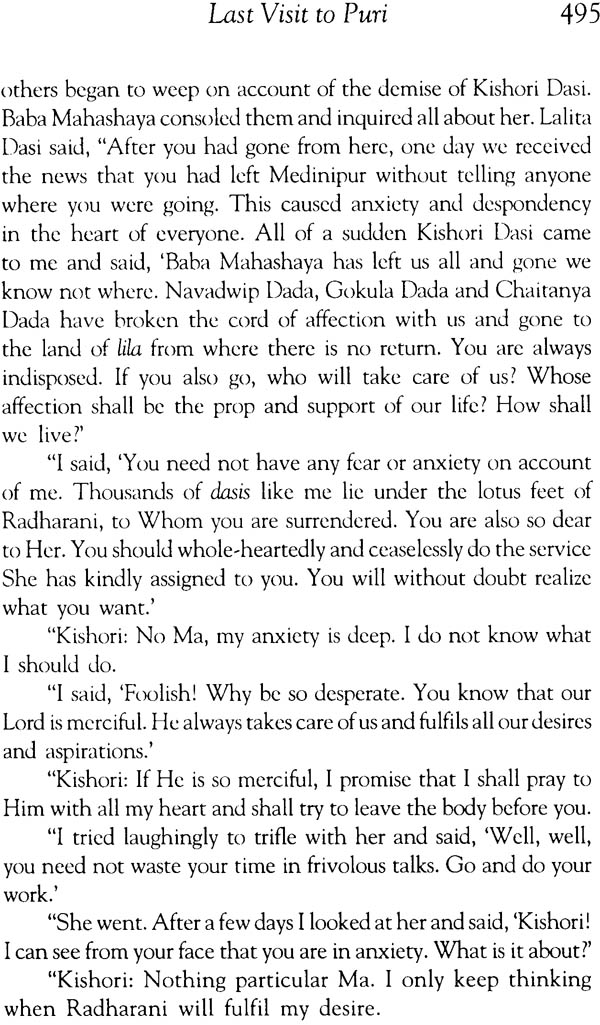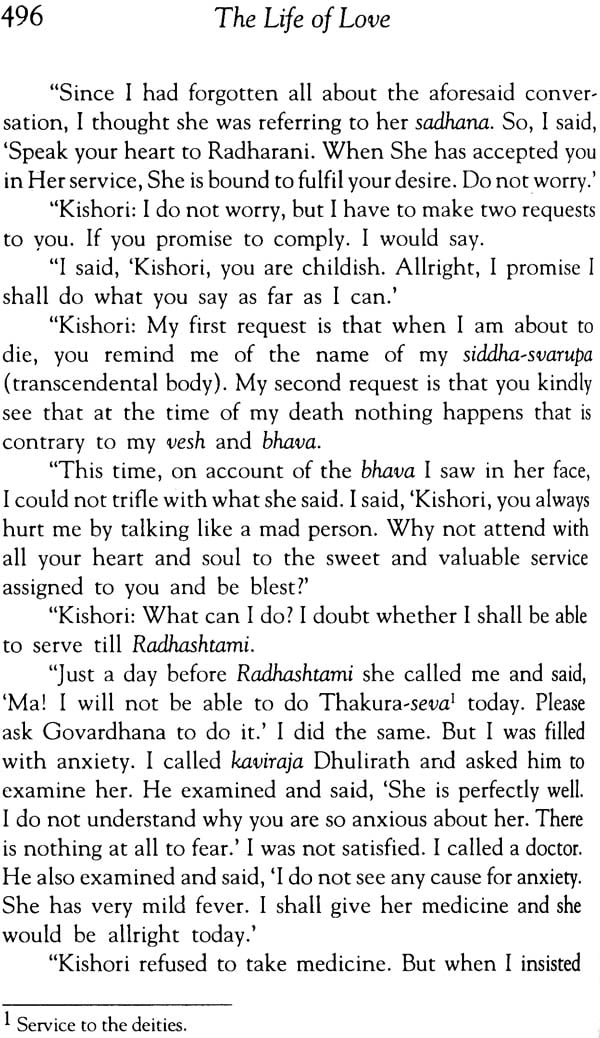
The Life of Love (Biography of Sri Srimat Radharamana Charan Das Deva The Veritable Embodiment of Sri Chaitanya Mahaprabhu’s Universal Religion of Love) (Old and Rare Book)
Book Specification
| Item Code: | IHK003 |
| Author: | Dr. O.B.L. Kapoor |
| Publisher: | Srila Badrinarayana Bhagavata Bhushana Prabhu |
| Edition: | 1993 |
| ISBN: | 9800712607 |
| Pages: | 563 |
| Cover: | Hardcover |
| Other Details | 8.6 Inch X 5.8 Inch |
| Weight | 760 gm |
Book Description
Born in 1909 Dr. O.B.L. Kapoor took his M.A. Degree in Philosophy from the University of Allahabad in 1931 and the degree of Doctor of Philosophy from the same university in 1938. He worked as Research Fellow Indian Institute of Philosophy Amalner, D.Litt. scholar university of Allahabad and Professor and head of the Dept of philosophy B.R. College Agra till 1952 after which he joined U.P Educational service class 1 and worked as Professor and head of the Dept. of philosophy K.N. Govt. college Gyanpur and principal govt. college Gyanpur/ Rampur till his retirement in 1967. Since 1967 he has been living in Vrindavan and writing books and articles on religious topics related mainly to Bhakti. He has so far written more than 25 books and a large number of articles published in different journals. His writings have provided inspiration to the academicians and non academicians alike and have set many firmly on the path of Bhakti.
Sri Radharamana Charan das Deva was a Living Embodiment of Sri Chaitanya Mahaprabhu’s religion of love. He carried Mahaprabhu’s message of love form door to door singing and dancing laughing and weeping in rapturous ecstasies like Mahaprabhu himself.
A veritable dynamo of Bhakti he lovingly embraced whomsoever he met and by his mere touch transmitted Bhakti into his heart. He was like an angel that came from above down below on earth only to alleviate our suffering by preaching that all our suffering could be easily removed and we could attain the highest goal of life the lotus feet of the lord if only we chanted the name of the lord. Since we the jives of kali would not easily believe this he mercifully took it upon himself to demonstrate the power of the name by curing diseases melting stones making the trees dance and animals behave like devout Vaishnavas and even by bringing the dead back to life through congregational chanting of the name of the lord.
In our age when there is a mushroom growth of pseudo sects and imitation gurus and millions of young men are in their search for truth asking endless question he stands our in this biography as the very embodiment of truth anticipating and answering all their question.
The life of love is the biography of Sri Srimat Radharamana Charan Das Deva popularly known as Barha Baba which means Baba the great. He was so called because he was truly great – Great in heart, great in love, great in power to do things which our men of reason and science would not believe even if they see.
He was a living embodiment of Sri Chaitanya Mahaprabhu’s universal religion of love. He was like a stream of love running its course and sweeping along with it every soul that came in its way toward the boundless and bottom less ocean of love and peace and Transcendental Bliss. He carried Sri Chaitanya Mahaprabhu’s message of love form place to place door to door and person to person singing and dancing, laughing and weeping in rapturous ecstasies like Mahaprabhu himself. A veritable dynamo of divine love he lovingly embraced whomsoever he met and by his mere touch transmitted a wave of love into his heart. Only to see him was to love him to hear him sing was to be baited to talk to him was to be captivated and to be embraced by him was to be sold out to him for ever and ever.
He was a flower that stemmed form the earth but was alien to all that was earthly. He was an angel that came from above down on earth to alleviate our suffering and to deliver us form bondage. He told us how all our suffering could be easily removed and we could attain the highest goal of life the attainment of the lotus feet of the lord and his loving service only through sankirtan or the congregational chanting of his name. Since we the jives of kali would not easily believe him he mercifully took it upon himself to demonstrate to us the inconceivable power of he divine name by curing diseases melting stones making the trees dance and the animals behave like devout Vaishnavas and even by bringing the dead back to life through the chanting of the name.
He taught both by example and by precept the religion of pure Bhakti distinguishing it form the so called Bhakti of the pseudo sects that had sprung up like mushrooms in the post Chaitanya era. Even now there is no dearth of pseudo sects imitation gurus and quacks in religion. These are the people who debase religion. But unfortunately this is what most people want and so feel attracted towards them. The few who want the truth get the truth. In our lord’s merciful dispensation there is no disappointment for them. There is for them the eternal exhortation of Christ ask and it shall be given to you seek and you shall find knock and the door will open.
Sri Radharamana Charan Das Deva stands our prominently before us as the very embodiment of Truth. In a time like ours when millions of young people are turning towards the mysterious east eagerly searching for answers to their never ending question the appeal of their biography in which he seems to anticipate and answer all their question is bound to be great specially because throughout these chapters he talks to them beyond the difference of centuries and continents races and nationalities ‘isms’ creeds and sects.
The biography of Sri Radharamana Charan Das Deva was first published in 1919 in six volumes in Bengali under the title Chant Sudha. It was anonymously written by siddha mahatma and a close disciple of Sri Radharamana Charan Das Deva. His biography in English was published in 1926 under the title the life of love. It was written by Sri Narendra Nath Chatterjee also a disciple of Sri Radharamana Charan Das Deva. It was perhaps intended to be the English version of charit sudha. But for some reason it could not be completed and remained more or less an English adaptation of only the first volume of Charit Sudha. I was asked to write the complete biography drawing as much as possible from all the six volumes of Charit Sudha and including what Sri Narendra Nath Chatterjee had already written in the shape of the first few chapters of the new work. I have done the same I have retained the title of the old work because no other title would have been so appropriate and I have included substantial part of the old work not only because it is beautiful written but also because as the work of a worthy disciple and close associate of Sri Radharamana Charan Das Deva it has a sancity and importance of its own. I have however been compelled by the exigency of space and the requirements of uniformity to drop some parts of it and include others after making minor changes here and there.
I am conscious of my various limitations inspite of which I have undertaken this task and the mistakes I must have committed. I can only beg my kind readers to view them with indulgence.
It is my pleasure to thank my friend Sri Swami B.R. Sadhu Maharaja for taking all the pains in typing and composing the work on the computer for preparing the glossary and for giving valuable suggestions from the standpoint of western readers. My gratitude is specially due to Sri Badrinarayana Bhagavata Bhushana Prabhu the Founder acharya of Sri Chaitanya Bhakti Rakshaka Mandapa for spontaneously and lovingly undertaking the publication of the work and publishing it speedily and beautifully.
Behold the man a man among men a flower of humanity indeed! Eye him keenly and you catch the beaming smile. How it differs from the laugh that speaks the vacant mind! And yet how different from the sardonic grin of worldly wise men! It is the smile of one who knows the whole truth and enjoys the blissful repose of a heart in communion with God. Look into the eyes deep in wisdom like the bottomless sea overflowing with love and tenderness divine. Mark the gentle curvature between the nose and the cheeks what a pathetic outburst of heartfelt compassion for the erring sons of men! The firm features the thick ser frame the capacious arms the spacious chest the noble pose the dignified mien above all the perfect self possession that is manifest in them all the creates the impression of a high order of virility and strength hardly to be met with me the commonalty of men we find in the world.
We talk of heroes and hero worship why here is a hero in the noblest sense of the term within the living memory of living men. For who is a hero? Is it the valiant man of a thousand fields that is never daunted by battalions? Here is a hero that knew no fear and made conquests of love wherever he want. Is it the man of gigantic intellect who has solved the problem of life and convinced the people of the truth of his principles? Here is the hero who done the same without logomachies and literary demonstrations who has imparted the truth like a tangible something so to speak by a single touch a close hearty embrace a tender look or a word of mouth and changed the whole course of the lives of men. Is it the moral man who stands for the greatest good of the greatest number of men the minimization of sufferings and scattering of happiness on earth? No man can hold a candle to him in respect of his achievement in this direction for he was like a ministering angel chasing away the sorrows of life wherever he appeared dancing and singing the name of the lord and scattering peace and happiness not only among men but also among the beasts – nay even the plants them selves as the following pages will show. Finally if by a hero we mean the saint who annuls his self and goes about with the message of god and ministers to the spiritual welfare of the world why here is just the man for it for he no paid parson for the parish he – he devoted his life to the salvation of the world expecting no returns no comforts nothing of the kind for himself giving away the best human treasure for nothing the treasure that buys the happiness of both the worlds for the simple reason that it was in his nature to give it away and it was thing only to be given away – love and nothing but love pure love divine which must be given away for the regeneration and resuscitation of the world.
We talk of cosmopolitanism. Our hero was a true cosmopolitan a true servant of god who found his god in every man in every being in everything he came across and loved and served accordingly without respect of caste color, creed, or even the species to which it belonged. To him it was all one whether it was a Hindu or a Muslim or a Christian for the matter of that an Indian or an Englishmen a Red Indian or a black Negro a man or a bull or a dog in the street in as much as all these had the indwelling spirit of god to whose love and service he had consecrated himself. If Hindus found in him a friend a philosopher a lover and a guide, Muslims and others were not excluded from his friendship and love, but readily received in the open arms of this man of infinite indiscriminate love. He used to weep in commiseration with the distress of the world lings tempest tost on the boisterous sea of life poor suffers of all the parts of the world here there and everywhere. On one occasion he resolved even to go over to Europe and America to show to the people the way out of the strafes and quarrels and the miseries of existence but then there was Baba Bharati with him who volunteered his services to spread the religion of love and bliss to those far off lands of the setting sun. His heart bled equally for all men alike.
Lastly there is the idea of the superman and this has engaged the attention of philosophers and given rise to valuable dissertations on the platform and in the press. The superman is the transcendental man a man so far above the average run of mankind that he can hardly be counted as a member of the species of ordinary mortals we call men. He is local a star that dwells apart and yet so neat living and moving and having his being under our nose before our eyes here on earth. He is to be seen for he comes to us from time to time and yet we cannot know him as he is we cannot properly estimate his worth for he surpasses the comprehension of ordinary men. He comes to hold out to us the generous ideal for the progressive human race for us to follow for the betterment of our lives the salvation of our souls. The superman is god’s own representative on earth and he ahs a mission to fulfill he has to work so as to leave the world better than he found it when he came. Knowledge love delight power and unity are some of the names of god. In the superman we find a sweet harmonious blending of all these divine virtues working in the fulfillment of his divine mission in life. Such a man we shall find our hero to be as we proceed to study him in all the wonderful details of his life.
Some say that he was god himself. We say that is more than we can know that is more than any man can and should take upon himself to say. Others say he was a superman a great soul the teacher of all the world, the savior of the age. He knows who knows we do not pretend to know as much. We say he was the man of love who loved for the sake of love loved one and loved all loved them as he loved his god loved them being lost in loving contemplation of his god; and loving thus he clasped them all in a loving embrace communicated to them his love divine and made them own for ever his own in god and loving and living for god.
So our hero is a man of love such a man is like the big banyan or the spreading oak a shelter from the fitful fever of life a fir refuge for weather beaten people under the storm and stress of an inclement world. Such a man is like the oasis in the midst of a desert appeasing the hankering of a soul, unappeased in its vain wandering in quest of happiness in the unhappy world. Such a man is like the breath of heaven on the hell fire of the manifold miseries of existence on earth. Then fly O fly you that suffer fly from the worries and troubles of the life and seek the shelter in the bower of love knowledge and power you find in this towering charming personality presented to your view.
| Preface xi | |
| Introduction: 1 | |
| Chapter: 1 | The Child 5; Birth 6; The Baby would not suck 6; Prasada and charnamrita :Spiritualization of food and water:7 The Horoscope 8: the school Boy 10 his delicate fears for human suffering:10 |
| Chapter: 2 | The young Landlord 13; The Early Dawn of later life: 13; The Landlord: 16; the last stroke that snapped the cord 18; the Departure 18 at the ferry dwark the ferry man 19 at bhavanipur The image of the divine mother 20 |
| Chapter: 3 | The Vision and voice of god 22; The Puras charan and the trance 23: the divine mother appeared in a dream and spoke to him 24; the vision of god the mother 25: the Dreams and visions of the pure heart are true 26; the idea of god is irresistible 27; god is personal impersonal and what not? The divine he and the she divine 28 we need spiritual eyes and spiritual ears to catch the vision and the voice of god 29 |
| Chapter: 4 | The Master and the Disciple 31; The great change 31 at the feet of the master 32 Raicharan and the attendant disciple 33; the initiation 34 |
| Chapter: 5 | The Teaching 37; See god in everything regard yourself as the lowest of all; 37 always repeat the mahamantra 42 serve the vaishnavas 43 the six verities but one for they are one with god 44; the ten commandments 46 god intoxication 47 the divine mandare; The seal and warrant 48 the parting counsel 49: the scriptures 50; the final order 51 |
| Chapter: 6 | The twin souls 53; At Navdwip 53; the hermit in the guise of a gentlemen 54 Raicharan becomes Rajen Babu 55; meeting with Navdwip 55; the twin souls in tune with each other 56 Navdwip forsakes the world to live with Rajen Babu; 57 |
| Chapter: 7 | In way to Puri 58; The marching song; Sri chanitanya the mightiest savior 58; the Beatific vision in the course of the sankirtan 59 the sankirtan party in precession 60; At kalna: The strange story of the living images 61 come one come all yours is the bliss of eternal fellowship and communion with god:64 |
| Chapter: 8 | The Barha babaji 66; The great grand land of the great grand god 66; the sankirtan in jagamohan 67; at gambhira 68; complete resignation to the will of the lord 70; the vision of Vrindavan; 71; the lila 73; imitation chaitanya 75 |
| Chapter: 9 | Talks on Sri Gauranga 78; Sri Gauranga’s universal religion of love; 78; the incarnation of sri Gauranga 80; proofs for the divinity of sri Gauranga 81 |
| Chapter: 10 | The ceremonies connected with lord jagannath 86; the Bath ceremony 86 jagannath appears as ganesh 88 the period of the lord’s rest 89; the lord’s Rejuvenescene 90 the cleansing of the jagannath house of the lord 92; the car festival of jagannath 96 at the gundicha mandir 101 the genesis of the form of lord jagannath 105 |
| Chapter: 11 | On way to Bengal 111; Rama Behra The cowherd 111; the Druken babu: 114 a night with a beggar 119 the naughty prince 122 the story of Shyamananda 122 |
| Chapter: 12 | The Quest end and means 129; |
| Chapter: 13 | Sanyasa Initiation 141; Meeting Chaitanya das 141; the festival of dogs 142 |
| Chapter: 14 | Sankirtan in krishnanagara 150; the amazing hariloot; 153; The amazing foot prints 155 |
| Chapter: 15 | The dancing tree 161; |
| Chapter: 16 | Navadwip’s death and revival 169; Babaji Mahashaya’s fever 171 the girl and the child in ecstasy 174 |
| Chapter: 17 | Sankirtan in plague ridden Calcutta 179; Meeting with rama das 179 visit to Calcutta 180; Meeting with pulin Babu 187 |
| Chapter: 18 | Back to puri 190; The journey by steamer 190 kirtan in the temple of Jagannath 193; sankirtan at the house of harivallabja babu 195 Ratha yatra and the demise of chaitanya das 197 |
| Chapter: 19 | Talks on Raganuga Bhakti and rasa 202; Prema 203 vaidhi and raganuga Bhakti 204; Rasa and its various kinds 205; the transcendental body; 210; the guru as attorney 211 |
| Chapter: 20 | Miracles in Bhakti yoga 213; conversion of a yogi the deliverance of a bitch; 215 Radharamana kunja the miracle of Mahaprasada; 217 absolute surrender to harinama 219; lord jagannath blesses jai gopal with sakhi bhava 222; The conversion of kala kunjadas 225 |
| Chapter: 21 | Deliverance of Jhanjapita math and after 227; The deity craves for the flutes 231; the deity begs for butter and sugar candy 232 meeting with a Christian priest 233 baba mahashaya assaulted by a man 237; vanchanidhi’s initiation in dreams 239 playing holi with boys 243 |
| Chapter: 22 | The journey to cuttack 247; The babu from madras 248; the house husband by a ghost: 251; meeting with swami keshavananda 259 return to puri 262 |
| Chapter: 23 | Travels in Orissa 264; Miraculous cure of gokula’s malady: 265 Ashtaprahar Kirtan 266; initiation of Krishnaman sinha 269 initiation of Dyutisinha the leper 269 departure of govinda dada 272; initation of a bitch 277; at khandagiri 281 at bandhadihi 283 at singapur 284 at dhaneshwar 285; at jajapur 287 |
| Chapter: 24 | Conversion of ananda mitra and other episodes 294; Testing lalita dasi; 294 festival in the temple of tota gopinath 296 offer of sri harivallabha basu 298 revival of gadadhara 300; conversion of ananda mitra 302 they came to rescue but where fense against harinama 317 |
| Chapter: 25 | Second visit to Calcutta 320; deliverance of Madanamohan 321 initation of prasanna babu 323 initation of Dinabhandu kavyatirtha vedantaratna; 325 at the house of jogendranath mitra in darjuparha 331; parting of Navadwip das 335; saving kunja das; 342 Navdwip parikrama 345 |
| Chapter: 26 | Returns to Puri 353; Ratha yatra 356; glorifying Mahaprasada: 359; arrival of phanibhushan das 360 offense and self exploration 361 jagannath’s daturn 365 gunasindhu 368 phani’s death and revival 371 |
| Chapter: 27 | Divine Madness or divyanmad 378; Puri in turmoil 378 Nama sankirtan yajna 379 emancipation of the parrot 382 ashramites charged with shakti 385 divyamad or divine madness 386 in police custody 388 departure for Calcutta 391; the state of Mahabhava 392; in the garden house of kedar babu; 393; the miracle of Radhakunda 394 Transcendental character of harinama 395; sannyasa diksha of rama das 398 more miracles 399 conversion of rasika babu 405; witnessing sri chaitanya lila 406 revival of a corpse 408 the grand Nagara kirtan in Calcutta 410 in Navadwip 413 return to puri 415 |
| Chapter: 28 | The Divine Guests 353; 420; the arrival of nitai gaura 425 |
| Chapter: 29 | Journey to Vrindavan 431; a month in siurhi 431 in dumka 435 in kashi (varanasi) 443; meeting with jagadish das babaji 451 meeting with swami keshavanada 452; talks and rejoicings in radhakunda 44 meeting with vimala prasada babu; 473 |
| Chapter: 30 | Second visit to Vrindavan 475; Nava- graham puja 476 the call the Vrindavan 477 return to puri 490 visit to urrarakhanda for the darshan of guru deva 491 |
| Chapter: 31 | Last visit to puri 493; Kishori Dasi 493 Rajarshi Banamali Roy’s visit to puri 498 ashtakalina seva and sri vigraha 502 guru purnima 504 birthday ceremony 507 |
| Chapter: 32 | Last days in Navadwip 512; on way to Navadwip 514 mercy 515 delivering gopal ghatak from the mouth of death 517 sri hari sabha and shitikantha goswami 519 prema versus seva 522 the supreme sacrifice 525 the arrival of sri sri radhakanta 527 |
| Appendix | Reminiscences 529; Sri Apara Prasad Paul 529; Sri Panchanan Mukhopadhyaya; 534 |
| Glossary | 535 |
